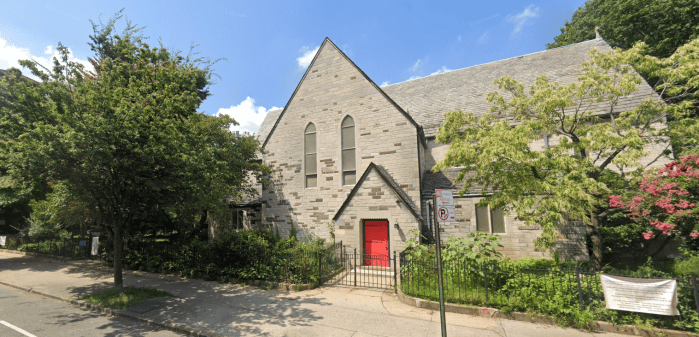
Photo via Google Maps
Sept. 25, 2024 By Melissa Zavala
Last year, St. Mark’s Episcopal Church, located on 82nd Street and 34th Avenue in Jackson Heights, turned one hundred. Nestled in the Historic District in the most diverse community in the World’s Borough, the church’s grounds represent a true green oasis in a bustling neighborhood where people from across the globe find a home. St. Mark’s grounds are admirable thanks to the love and labor of volunteer gardeners.
The garden is anchored by a tall Albizia tree, commonly called the Persian silk tree, also referred to as a mimosa tree. Recognizable by its “sleeping” leaves which close at night and during storms, this hearty Asian tree, like so many other new arrivals, is at home in Jackson Heights. Its fuzzy pink flowers blow in the wind in the heart of summer, forming a part of the Chinese pharmacopeia as tea with antidepressant elements. This tree is emblematic of how green spaces are not just critical responses to climate change but to the epidemic of depression currently gripping the country. They serve as meeting points, offering beauty and community.
Unfortunately, and against the wishes of this community, the church is now looking to maximize the revenue from this property. Rather than preserving a cherished community green space, the church could potentially build a multi-story condo building. This plan is short-sighted and unfavorable to the community. The lot must be preserved as a living green space for Jackson Heights.
As population increases, temperatures climb, and the effects of climate change strain our infrastructure, porous surfaces and tree canopy are vital. While heavy skyscrapers cause the city to sink, open spaces absorb excess stormwater which typically pollutes surrounding waterways, causing damage to urban infrastructure, from subway flooding to electrical fires and sewage overflows. Places like St. Mark’s backyard provide precious ecosystem services (direct and indirect benefits from healthy ecosystems). With Jackson Heights being one of the most congested neighborhoods in Queens, according to a 2013 report, in a city recently described as having the worst car congestion, a pocket park would benefit the community more than another multi-story unit offering ever more unaffordable apartments built on a street serving as bus route for two city transit lines and the fire department’s EMS path to Elmhurst Hospital.
Though most residents mainly experience St. Mark’s grounds through the meditation garden on 82nd Street and the less accessible garden on 81st Street, the backyard is the biggest of all. Mostly closed to the public, especially given its use by a local preschool, the yard nevertheless hosts community events open to all, from family fairs to BBQs, Easter egg hunts, and more. As a public park, it would be even more accessible.
When considering conservation versus development in the city, Robert Moses instantly comes to mind. With this year being the fiftieth anniversary of Robert Caro’s pivotal biography, The Power Broker: Robert Moses and the Fall of New York (1974), it is worth reflecting on Moses’ complicated legacy. After all, as he advanced car culture, he also preserved open spaces across the city in his twenty-six-year tenure as Parks Commissioner when pocket parks grew from 119 in 1934 to 777 in 1960. The value of parkland is ever more important now as the number of cars on roads grows, construction continues unrestrained, and the threats posed by climate change mount.
What preservation lessons have we learned in the more than six decades since the end of Moses’ tenure? For one thing, we know that this lot is worth more than the rent from a few luxury apartments. The green space, including the majestic Albizia tree, must remain a living space for our neighborhood.
*Melissa Zavala is an anthropologist studying urban biodiversity, climate change, waste, and pollution in New York City. She is a Jackson Heights resident.
